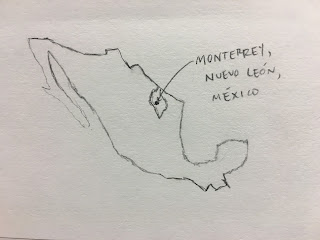
During the summer of 1999, I moved to Monterrey, Mexico. What started out as a possible one-year adventure has turned in 17 years and counting. I went to a private, international, bi-lingual school. I associated myself with people from over a dozen cultures and nationalities, and who have now worked in dozens of different industries.

In Mexico, we built a house. My father was paid in American wages. The house was made with Mexican labor. The tile, wood flooring, light fixtures, and furniture were all imported from southern Mexico and Western Europe. The inspiration for the house came from a northern California home seen in an international magazine. The design is rural Spanish.
Though small, this is one way globalization has benefited my family.

I have a twin brother in the business school, as well as a father that is an international tax accountant. We are similar in many beliefs.

They argue as well that globalization is vital for growth in this country and in the world. Without it, markets would slow down and crash. It's threaded into our society. Even during the economic crisis of 2008, it was globalization that helped pick the markets back up.

Adam Smith wrote in the Wealth of Nations (1776), that free trade was the best form of world market. By combining the strengths of all nations, we were creating a network of prosperity for everyone.

Tariffs, embargoes, and limitations on the market distory and stunt growth. They prohibit ideal conditions.

Pankaj Ghemawat discusses globalization in a TED talk, "Actually, the World isn't Flat." He argues that we over-emphasize globalization in this world. We have a habit of exaggerating our beliefs, knowledge, perceptions, and statistics. The world isn't as laid out and flat as we think it is. We're still not that global.

Because of our skewed perceptions, we're actually only about 10% as global as we think. We've only touched the top of the iceberg. Because of how unique our cultures still are, we've created great divides that limit our growth.

Clotaire Rapaille, in The Global Code, argues this same point regarding a social globalization. This social aspect ties in perfectly to the economic aspect. There is such thing as a Global Tribe, which is the group of people in this world that have extended beyond borders and become a conglomerate culture, regardless of where they're from. These people have found unifying bonds between themselves over the internet. It's these people that have paved the future for globalization, and it's where we all need to become a part of.

Our future is in the unification of people. If we can unify our language and communication (social media), proficiency, nationalism (for whatever country we live in), ideologies, economy, and culture, we will succeed. Just like how our economy hinges on our ability to work together in the future, our lives depend on our ability to join a Global Tribe.
That is why globalization is the future's backbone!

Mitchell, I thoroughly enjoyed your images and your argument for globalization. The images were simple and clear, as well as your paragraphs. They carried weight in just a sentence or two. Your personal story about your global home was extremely engaging and made me as a reader care about what you were saying. Great work.
ReplyDelete